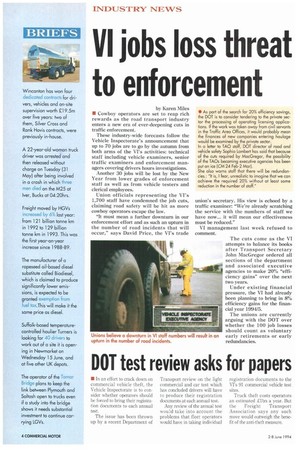VI jobs loss threat to enforcement
Page 6

If you've noticed an error in this article please click here to report it so we can fix it.
by Karen Miles • Cowboy operators are set to reap rich rewards as the road transport industry enters a new era of ever-deepening cuts in traffic enforcement.
These industry-wide forecasts follow the Vehicle Inspectorate's announcement that up to 70 jobs are to go by the autumn from both arms of the VI's activities: technical staff including vehicle examiners, senior traffic examiners and enforcement managers covering drivers hours investigations.
Another 30 jobs will be lost by the New Year from lower grades of enforcement staff as well as from vehicle testers and clerical employees.
Union officials representing the VI's 1,700 staff have condemned the job cuts, claiming road safety will be hit as more cowboy operators escape the law.
"It must mean a further downturn in our enforcement effort and as such an upturn in the number of road incidents that will occur," says David Price, the VI's trade union's secretary. His view is echoed by a traffic examiner: "We're already scratching the service with the numbers of staff we have now.., it will mean our effectiveness must be reduced."
VI management last week refused to comment.
The cuts come as the VI attempts to balance its books after Transport Secretary John MacGregor ordered all sections of the department and associated executive agencies to make 20% "efficiency gains" over the next two years.
Under existing financial pressure, the VI had already been planning to bring in 8% efficiency gains for the financial year 1994/5.
The unions are currently arguing with the DOT over whether the 100 job losses should count as voluntary early retirements or early redundancies.
















































































